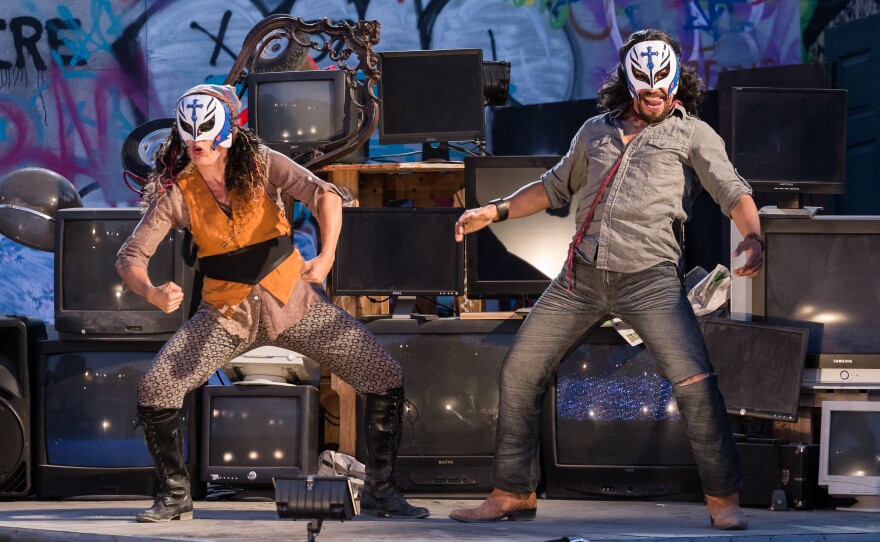ANCHOR INTRO: Shakespeare goes Mad Max as part of La Jolla Playhouse’s Without Walls site-specific program. KPBS arts reporter Beth Accomando takes us to the post apocalyptic San Diego of El Henry. TAG: El Henry continues through June 29 at SILO in Makers Quarter in East Village. Watch for Beth’s Evening Edition video tonight. Without Walls isn’t kidding. SAM WOODHOUSE: There’s no theater, this is NOT a theater. The plays in this series are site specific, placing a director like Sam Woodhouse at a creative ground zero. SAM WOODHOUSE: This is a sandlot, downtown against some buildings with graffiti on them. Woodhouse had to bring in everything from the theater seats to the junk that litters the stage. The lack of walls also means there's nothing to separate actors like Lakin Valdez from the outside world. CLIP Sirens LAKIN VALDEZ: You hear the sirens passing by, people screaming and it’s wonderful to be able to take those challenges and to actually transform them into another part of your performance. Valdez plays the title character in the world premiere of Herbert Siguenza’s El Henry. HERBERT SIGUENZA: We’re here at the Maker’s Quarter, SILO, in the East Village where we are doing the site specific play, an adaptation of Henry IV in a post apocalyptic San Diego. Siguenza sets El Henry in San Diego of 2045. HERBERT SIGUENZA: I mean right outside this street there’s homeless ok, that could be 2045 but we’re at 2014 so people just coming to this neighborhood start feeling different and once they come in here they don’t distinguish between reality and fantasy and we basically brought what the street offers on the stage. And what’s on stage is a boldly reimagined Shakespeare incorporating helicopters flying overhead, police cars driving by, and homeless people pressing against the chain link fence to see what’s going on. It’s what Siguenza calls a post-Anglo society in which California has been left to the Latinos and Chicanos. CLIP You heard me right, I said gringo exodus, back in 2032 there was a global bank collapse Siguenza taps into the chaotic social and political upheaval that’s in the Bard’s play. HERBERT SIGUENZA: Henry IV is, the original, is about loyalty, family, coming of age, relation between a father and son during war, and I thought these were the same traits and concepts that Chicano gangs live by and die for as well. KINAN VALDEZ: The adaptation that Herbert has created and Sam has directed is akin to a graphic novel. CLIP The end of Hank and his family commences today. Kinan Valdez plays El Bravo, the character inspired by Shakespeare’s Hotspur. He runs around stage in football pads blasting away enemies amidst the urban decay. SFX Guns KINAN VALDEZ: This particular space helps, the idea of a desolate landscape when you are running through this space and having dirt fly everywhere it actually heightens the drama and makes our work easier. And in a sense the audience’s as well. It doesn’t take much to imagine you’re in a dystopian future. A truck serves as base for the homeless Fausto, the play’s Falstaff character, and a cargo container with a purple bucket seat on top is where Hank rules the barrio from. Woodhouse says you will find all the elements of Shakespeare’s history play here… just with a twist. SAM WOODHOUSE: It’s a history-war play with warring factions. So all of that Shakespearean invention remains but the language is completely different, it’s Caló, it’s a mixture of Spanish and English and so the audience doesn’t have the challenge of trying to understand Shakespeare, they have the new challenge of understanding Caló. Which is fine with Siguenza who’s struggled with Shakespeare’s text for decades. HERBERT SIGUENZA: I have always been frustrated with Shakespeare because of the language. I find it strange quite frankly that we’re still reciting poetry from 16th century. I think we’re at another place now where we can I think start adapting those thing and putting it more in perspective to what we can relate to, Modern audiences may not relate to English kings but El Henry makes them feel the immediacy of Shakespeare’s themes says Sam Woodhouse. SAM WOODHOUSE: It’s like what’s happening in Iraq now. Who’s going to be in charge, will there be one, will the authorities rule, will gangs rule, will it be a partnership, will it be a coalition that ruled? So the question of who runs the country, I think is as relevant today as any time. That’s the irony playwright Siguenza sees. Shakespeare’s play is more than four centuries old but its themes of war, honor, and violence are as relevant and human as ever. Beth Accomando, KPBS News.
Shakespeare goes "Mad Max" as part of the La Jolla Playhouse/San Diego Rep Without Walls site-specific program: You can go to the post-apocalyptic San Diego of “El Henry.” The performance runs through June 29 at SILO in Makers Quarter.
And they're not kidding when they say "without walls."
“There’s no theater, this is not a theater,” Sam Woodhouse said, pointing to the open space of the abandoned lot at Makers Quarter.
The plays in this series are site-specific, placing a director like Woodhouse at a creative ground zero.
“This is a sandlot downtown against some buildings with graffiti on them,” Woodhouse added.
Woodhouse had to bring in everything: from the theater seats to the junk that litters the stage. The lack of walls also means there's nothing to separate actors like Lakin Valdez from the outside world.
“You hear the sirens passing by, motorcycles, people screaming — so in that sense, they become a part of the performance as well,” Valdez said, “So as long as you embrace that idea and just say, ‘OK, we surrender to you San Diego. Let us join you in this chaos that is the downtown area,’ and it’s wonderful to be able to take those challenges and to actually transform them into another part of your performance.”
“El Henry”
World Premiere
June 14 through June 29 at
SILO in Makers Quarter, 753 15th Street, East Village
Valdez plays the title character in the world premiere of Herbert Siguenza’s “El Henry.”
“We’re here at Makers Quarter, SILO, in the East Village where we are doing the site-specific play, an adaptation of ‘Henry IV’ in a post-apocalyptic San Diego,” Siguenza said.
He sets “El Henry” in San Diego of 2045.
“I mean right outside this street there’s homeless that could be 2045, so people just coming to this neighborhood start feeling different and once they come in here they don’t distinguish between reality and fantasy,” Siguenza said, “And we basically brought what the street offers on the stage.”
And what’s on stage is a boldly reimagined Shakespeare incorporating helicopters flying overhead, police cars driving by, and homeless people pressing against the chain link fence to see what’s going on. It’s what Siguenza calls a post-Anglo society in which California has been left to the Latinos and Chicanos.
Fausto (the Falstaff character that Siguenza plays in “El Henry”) explains to the audience: “You heard me right, I said gringo exodus. Back in 2032, there was a world-wide bank collapse, and Mexico went completely bankrupt and 50 million Mexicans fled north crossing into California. No laws, no fence, no drones can keep them out. Raza everywhere!.”
Siguenza taps into the chaotic social and political upheaval inherent in the Bard’s play.
“’Henry IV,’ the original, is about loyalty, family, coming of age, the relation between a father and son during war, and I thought these were the same traits and concepts that Chicano gangs live by and die for as well,” Siguenza said.
“The adaptation that Herbert has created and Sam has directed is akin to a graphic novel,” Kinan Valdez, Lakin’s brother, said.
Kinan Valdez plays El Bravo, the character inspired by Shakespeare’s Hotspur. He runs around stage in football shoulder pads blasting away enemies amidst the urban decay.
“This particular space helps us as performers imagine the world because it’s right here in front of us,” Kinan explained, “So the idea of a desolate landscape when you are running through this space and having dirt fly everywhere, it actually heightens the drama and makes our work easier.”
Companion Viewing
“Chimes at Midnight” (1965)
"Mad Max" (1979)
“Henry V” (1989)
“My Own Private Idaho” (1991)
And in a sense the audience’s as well. It doesn’t take much to imagine you’re in a dystopian future. A truck serves as base for the homeless Fausto, and a cargo container with a purple bucket seat on top is from where Hank (the Henry IV of the title) rules the barrio. Woodhouse says you will find all the elements of Shakespeare’s history play here—just with a twist.
“The story is Shakespeare’s story, slightly modified by Herb, in some cases greatly modified, but it is a Shakespearean story; it’s a war play,” Woodhouse stated. “So all of that Shakespearean invention remains but the language is completely different. It’s Caló, it’s a mixture of Spanish and English and some made up words that didn’t exist that are sort of street lingo, street language. So the audience doesn’t have the challenge of trying to understand Shakespeare, they have the new challenge of understanding Caló.”
Which is fine with Siguenza, who has struggled with Shakespeare’s text for decades.
“I have always been frustrated with Shakespeare because of the language,” he said. “I find it strange quite frankly that we’re still reciting poetry from 16th century. I think we’re at another place now where we can, I think, start adapting those things and putting it more in perspective to what we can relate to.”

Modern audiences may not relate to English kings but “El Henry” makes them feel the immediacy of Shakespeare’s themes.
“It’s like what’s happening in Iraq now: Who’s going to be in charge? Will there be one? Will the authorities rule? Will gangs rule? Will it be a partnership? will it be a coalition that ruled?" Woodhouse said. "So the question of who runs the country, I think is as relevant today as any time.”
That’s the irony playwright Siguenza sees. Shakespeare’s play is more than four centuries old but its themes of war, honor and violence are as relevant and human as ever.








